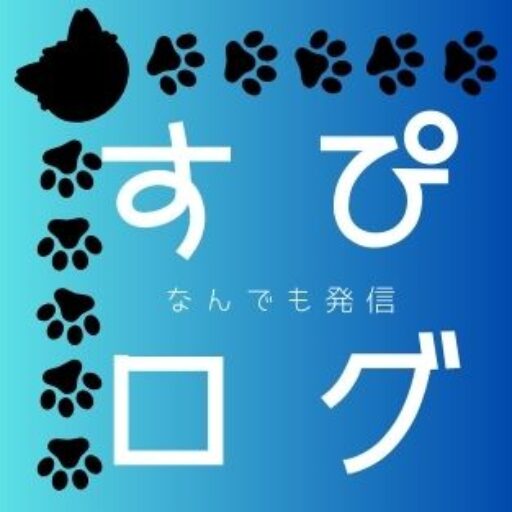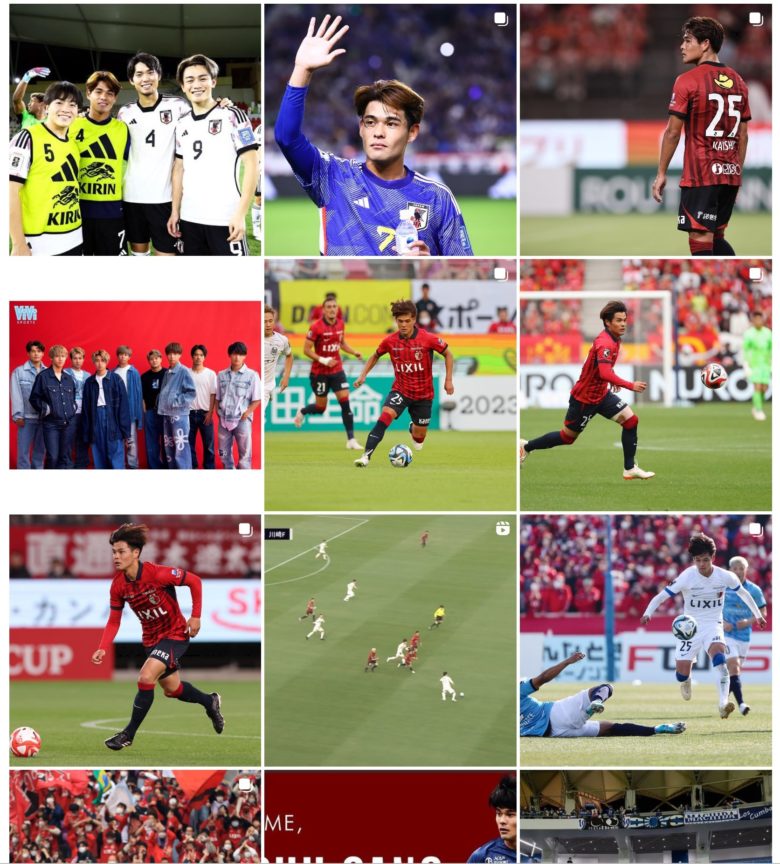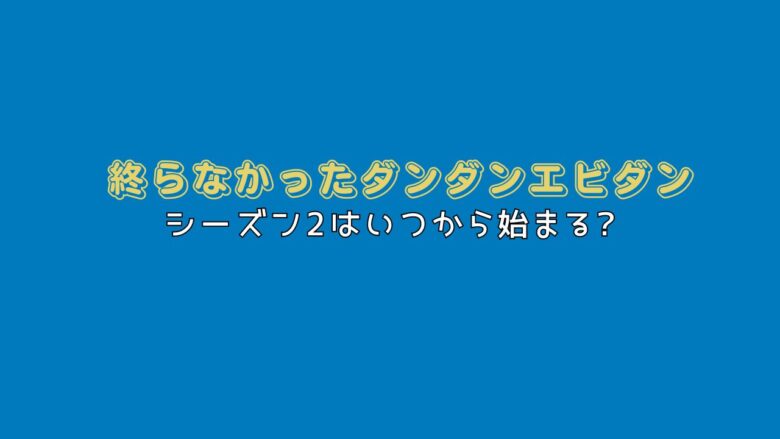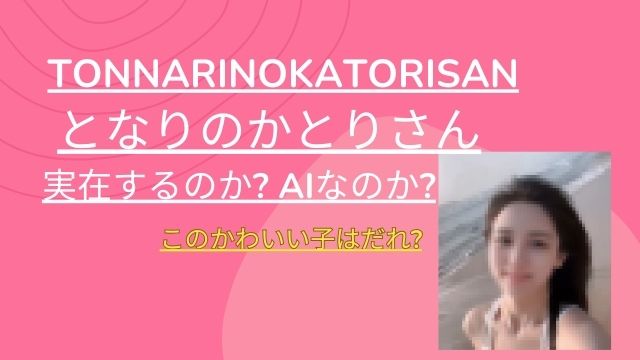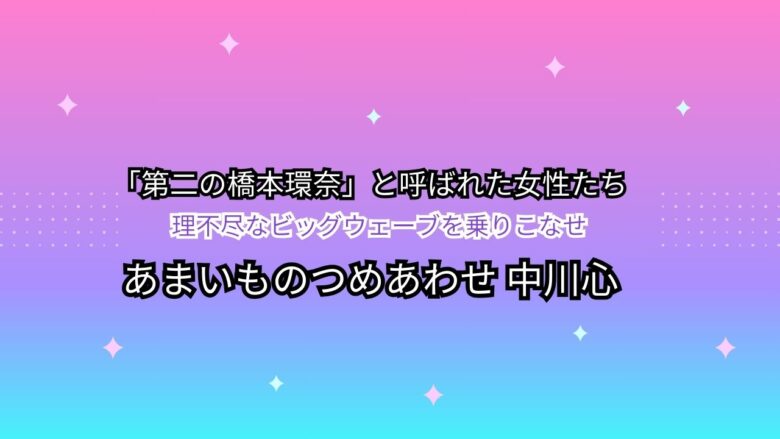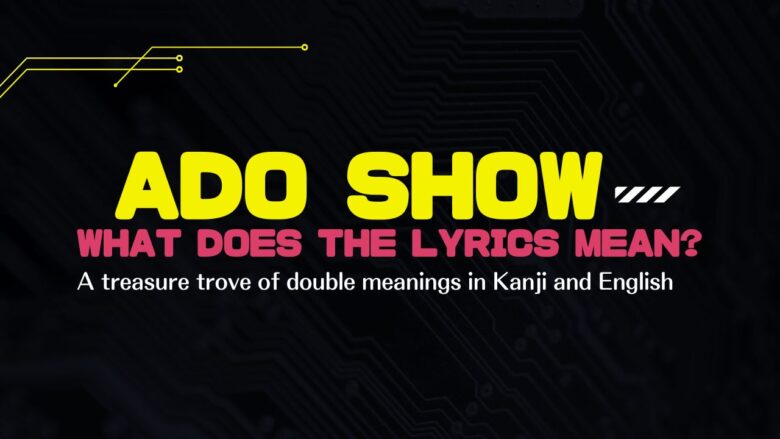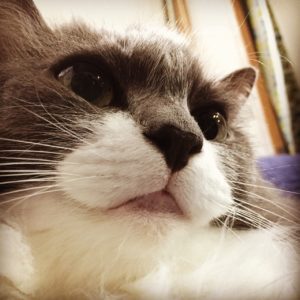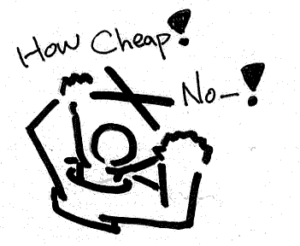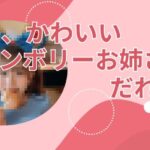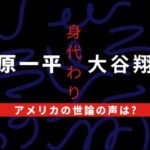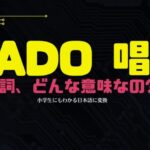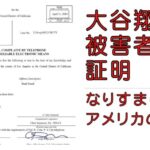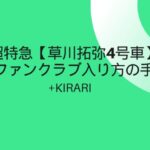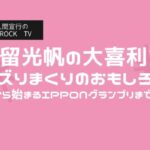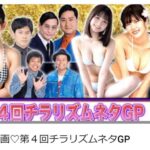Ado's "show" posted on YouTube on September 5, 2023. It's an overwhelming piece of work where you can't help but grin at Ado's incredible vocals, as you quickly get caught up in the whirlpool of rhythms that seem to be folding. I don't remember vocals like this ever.
While watching the MV, the lyrics appear on the screen in a cool way, but the production is so cool that it's hard for me with farsighted eyes to follow along.
What kind of lyrics are there? I couldn't figure it out no matter how many times I listened to it. Then, show'' got lost in the busyness of my daily life, but recently, out of nowhere, I heardshou'' again.
“As expected, this song is amazing.”
So I decided to try translating it into Japanese.
In this article, I would like to write the complete Japanese translation and the meanings and interpretations of the words I researched to write it.
目次
I googled it first
Before translating it into Japanese, I first googled it.
If someone has already written an easy-to-understand Japanese translation, there's no need for me to write it…
However, there wasn't anything that really clicked with me.
It's just matching the appropriate lyrics to the music, isn't it?
When I looked into it, I found that there were several posts on the Yahoo question box asking about the meaning of ``show''.
There were many answers like this,
“Since the sound is prioritized, you just fit in words that fit the rhythm.”
Too many people thought, ``I'm just trying to find words that fit that fast rhythm and string them together.''

Really…is that so? It was written by a first-class lyricist, right? Do you just randomly connect words that match the sounds?
Who is the lyricist?
Lyrics:TOPHAMHAT-KYO (FAKE TYPE.)様
???
How do I read this?
So, I googled and did a lot of research.
TOPHAMHAT-KYO
It's pronounced "Topham Hat kyo."
A person's name.
The name comes from his past as a ham maker and his favorite character, ``Sir Topham Hatt'' from Thomas the Tank Engine. Before that, his name was "AO".
As of March 2024, he is active in the unit named "FAKE TYPE."

There is no way that the "shou" created by these people is just a list of words that follow a random rhythm.
Ado 「SHOW」Meaning
So, I decided to do some research and write about it.
Although most of the lyrics were in Japanese, I felt like I was translating English into Japanese.
overall image
When I read all the lyrics slowly, the first thing I felt was,
- There's someone singing on stage
- Showtimes from evening to night
- I wonder if it's a song that stirs up the audience…
- Rride the rhythm more!"
- “Dance more!”
- I started with the image of Ado's live performance, the opening song, and the first song that would stir up the audience.
This is a translation into Japanese that even elementary school students can understand.
I thought this would be a better way to view the lyrics while playing the ``shou'' in the video, so I decided to make it possible to scroll through the lyrics as well.
The era of translating Japanese lyrics into easy-to-understand Japanese has arrived.
``Shou'' is a song that has a lot of Japanese in it, and when you look at the lyrics, there are more Japanese than English. The lyrics are a mix of ancient and modern Japanese, English, and Latin.

Let's look at them in order. I have translated it to my own taste, so it may not necessarily match everyone's image, but since this is a song…I don't think there is a correct interpretation, so this is how I feel. Thank you for that.
- DOKUDANJYO 独壇場 ⇒ solo stage
- KABUKE 傾け ⇒ At first I thought it was pronounced "KATAMUKE," and I thought it meant "listen carefully." but later, when I watched a video where Ado explained how to sing, I learned that it was pronounced "kabuke". ``KABUKE'' means to have an unusual appearance.
- FURIKIROU 振り切ろう ⇒ Considering that it's pronounced "kabuke" and that it's USJ's Halloween zombie party song, it's a good idea to "don't be shy and dress up in a strange way." I interpret this to mean that You are going to dress strangely and make a fuss until the needle on your mood meter goes all the way.
- ONARI 御成り ⇒ A nobleman, a great person. It can mean a great person at the top of society, but if it's a song that excites the audience at a live venue, it might refer to a bossy person sitting on his back in the VIP seat who doesn't dance. I don't know
- YOI 宵 ⇒ Shortly after sunset. Interpreted as the time just before nightfall when it is still light.
- COMPLETE ALL LIGHT HELL コンプリートオーライ hell ⇒ I observed that "complete" means "completely..." and is combined with "alright", and in this case the English word "hell" is not "hell", but is used for emphasis.``This dusk will be completely mine'', translated into Japanese .
- Brah brah brah ⇒ Since it is a colloquial style when saying things like, etc., choose words that give you an appropriate feeling.
- E MO IWARENAI えも言われない ⇒ It means indescribable… If I think about it, it's probably the beat, the rhythm, the music. Randomly translated into Japanese as “a rhythm that cannot be compared”
- ZENDO KENRAN GOUKA 全土絢爛豪華(ぜんどけんらんごうか) ⇒ It means that all lands are luxurious and gorgeous, but since the song is called ``shou'', I guess that in this case it means the stage. It is interpreted as an analogy of a beautiful landscape with penlights and lighting.
- Attention SAWAGOUKA Attention騒ごうか ⇒ Attention is used to mean "attention" when speaking in public, and the stage is gorgeous and beautiful, but please pay attention to me!!
- ISHI-HYOUJI NI MOUJIKI SYOUGEKI NO KOE TAKARAKA DOUDOU TOUBAN 意思表示にもうじき衝撃の声高らか堂々登板(どうどうとうばん) ⇒ It was determined that the order of the Japanese words had been changed in order to get into the rhythm. I interpret it to mean, "Soon, I will appear on stage with a shocking voice and a loud statement of intent."
- MOU GARANDOU WA TOTTKUNOTOU TOUTA もう伽藍洞(がらんどう)は疾っくの疾う淘汰(とっくのとうとうた) ⇒ Garando can mean a temple, but it can also mean a cave. Judging from the meanings in the part of " "TOTTKUNOTOU TOUTA" = disappeared'', it means that the empty stage has been filled with audience '', so the empty stage is no longer there''.
- Aye RYOURAN-OUKA ODEMASHIDA Aye繚乱桜花(りょうらんおうか) 御出ましだ ⇒ When I looked it up, I couldn't find the word 「RYOURAN-OUKA」. I could have been against it. 「Ouka-Ryoran」 also has the same meaning, and I guess it's a kind of inversion with rhythm riding in mind. 「Ouka Ryoran」means that the cherry blossoms in full bloom. It is also very bright and gorgeous. Since the expression is in contrast to the empty stage mentioned earlier, it is interpreted that the song is not about actual flowers, but about lights, lasers, penlights, etc. shining like flowers.
NOTAMAU DANTO-DAI NO UEDE

I was worried about this…
- NOTAMAU DANTO-DAI NO UEDE HASYAGE KAREI 宣(のたま)う断頭台の上で 燥げ華麗(はしゃげかれい) ⇒ ``NOTAMAU'' means to say something bossy. As for who's singing and saying things in a big way, it's none other than Ado, given the flow of the lyrics. The place where they are singing so proudly is the DANTO-DAI… Simply put, a DANTO-DAI is a guillotine.
Why did "guillotine" suddenly appear in the lyrics…and I thought about it.
As long as a song has a message, it can come across as overbearing depending on the time and the listener.
Ado is singing on stage, but for Ado, this stage is a guillotine. Where Ado is executed. It may sound like 「I'm looking down from above and singing with pride, but if my song doesn't resonate with you, it means my death. The song is myself, because it's me」.
I suspect that the lyrics have the meaning that "Ado is risking his life to send a message to you…"
Similarities between guillotine and hanging
When I see these lyrics, an old man in my 50's is reminded of THE BLUE HEARTS's "From the Hanging Pillar." Japanese title is 「Kubitsuridaikara」.
A man who lived according to his desires. Before he knew it, he had become a wanted criminal and was on a hanging stand. The lyrics do not mention what kind of wrongdoing he committed. ``Desire is the only thing that is real, and if you live according to it, you will be put on a hanging stand.'' I laugh and sing this song, but can you laugh at that?Are you living faithfully to your desires?This is a song that asks the question.
How many people will there be in 2024 who don't know about "Hiroto Koumoto"? On the other hand, will there be fewer people who know about him? He is a musician that I would like those who don't know to know about. There are a lot of good songs, so please listen to them. Especially to the younger generation who don't know anything about him.
- warning ⇒ When I think about the content of Komoto Hiroto''s song, theWARNING'' written on the wanted criminal's poster comes to mind. However, in the case of "show", the lyrics are about stirring up the audience who are not fully into the music, so the lyrics are "warning", meaning "those of you who are not excited, you deserve a red card". I wonder if it's okay to take it as it is? I'm guessing.
Word choices that follow the beat and rhythm

From this point on, the word choices become more creative. It's natural that the first priority is placed on following the rhythm and beat, but the more I looked into it, the more I realized that the meaning of the lyrics remained consistent and was carried through with intention.
- HANNARI KANJYOU DORINI HATTSOUTOBI はんなり感情通りに八艘飛び(はっそうとび) ⇒ "HANNARI " means elegantly and gorgeously. "HATTSOUTOBI'' is a word that originated from Minamoto no Yoshitsune's jumping, and is an example of flying around lightly. 「Fly as you please in an elegant and gorgeous way」 I translated into Japanese.
- HIFU WO YABURISOUNA HODONI HANERU SHINZOU KURAI GEKIJYOU TEKI SHOW 皮膚を破りそうな程に跳ねる心臓くらい激情的仕様 (Exotic vox) ⇒ Vox means voice in Latin. “Passion” is an emotion so violent and strong that it cannot be stopped. I took it to mean a strong, exotic voice that I couldn't stop.
- KOTOBUKI 寿(ことぶき) ⇒ Happy things to celebrate, long life, long life
eeny meeny miny moe
- INIMINIMANIMO イニミニマニモ ⇒ eeny meeny miny moe, which is the English version of ``Which one should I do? ''
- GORAIJYOU KARANO GORAIKOU ご来場からのご来光 ⇒ From the word ``GORAIJYOU,'' I decided that it meant the audience who came to the live performance. My guess is that there are some people who stand out among them. In other words, I speculated that there might be multiple "unlucky audience members" who don't dance much. I imagined a scene where Ado was looking at multiple people and wondering which one had the worst mood.
- KAKURENBO SHITERU SONO KIMOCHI KAIHOU (RISEI ADIOSU) かくれんぼしてるその気持ち解放 (理性アディオス) ⇒ Playing hide and seek means that the audience is not able to get into the rhythm. Ado plans to force everyone to free themselves.
- SYAKARIKI JIMICYAU しゃかりきじみちゃう ⇒ I think the correct way to paraphrase SYAKARIKI JIMICYAU is sentence 「Syakariki jimite kicyau」."Shakariki" means to be passionate about something." Jiteru'' meansit really feels like that,'' so I interpreted it very arbitrarily and translated it into Japanese, and ``it gives it a serious feeling.''
JABARABA DABI KATARU NIMAIBA、YASHINKA SHITTO SURU YOUNA JUICE
and the difficulty……paraphrase
JABARABA DABI KATARU NIMAIBA
- JABARABA蛇腹刃(じゃばらば) ⇒ A type of fictional weapon with a mechanism in which the blade part is connected by wire and splits at equal intervals, resembling a whip.
- DABI 蛇尾(だび) ⇒ It has been determined that it is a coined word attached to the word bellow "JABADABI'', as it is used in the same way as "Dabi" in ``Ryutoudabi''. Probably to adjust the rhythm. Especially the rhythm here and Ado's vocals are pleasant. Ryutodabi (Ryutodabi) The meaning is that of a dragon with a magnificent head but a meager tail, and it is also used as an analogy of a snake that has good momentum at the beginning, but slumps and loses its momentum at the end.
- KATARU NIMAIBA 騙る二枚刃 ⇒ “Kataru” means to deceive someone by saying something clever.
- I don't know much about the JABARABA, but it seems like a powerful weapon, so I guess it's used as a metaphor for the dragon's head in "Ryutodabi." From the meaning of the word " kataru'' in the second half, He is so armed that he joins the audience with the intention of not following Ado's rhythm, but it's not a serious weapon (it's just a double blade).'' I settled on this outrageous translation.
- Audience members not following the rhythm. Ado likens what protects the walls of their hearts to a powerful weapon called a JABARABA. However, in reality, it wasn't a powerful weapon, it was just a simple defense with two blades, so I interpreted it as saying, ``I'm going to destroy it and release you''…
- YASHINKA SHITTO SURU YOUNA JUICE 野心家嫉妬するようなジュース ⇒ This is where I had the most trouble. How should I translate the word YASHINKA into Japanese? ``YASHINKA'' are people who secretly have big hopes, or people who have hopes that are unbecoming of their social status.
- Are people who think "I don't have to dance or ride, there are other fun things to do" and people who don't enjoy Ado's music considered YASHINKA? I thought. The word choice is probably based on the beat, so even if the meaning of " YASHINKA" doesn't match perfectly, it's probably no problem.
- What is juice? I guess it's sweat, I thought.
- What is jealous is the ambitious person's body itself, and a strange phenomenon is occurring between the mind and body, and even if the audience thinks that they will not dance in their hearts, their bodies react to the sound and sweat with jealousy. The situation and interpretation is that…
karma is difficult
- TABURAKASUNA KATTO NATCHA IYA たぶらかすなかっとなっちゃ嫌 ⇒ "TABURAKASU" means deceiving. So, I translated it into Japanese as "Don't deceive yourself," and the second half of the song, "KATTO NATCHA IYA," is "KATTO NATCHA INA," which means "be angry at yourself," to YASHINKA, and to Ado, "KATTO NATCHA IYA," don't direct your anger at Ado. I guess it has a double meaning.
- KARUMA NI ITARU MAENI TAYUTAUWA カルマに至る前に 揺蕩うわ(たゆたうわ) ⇒ I wonder if karma is the substance of good and evil created by human actions and consciousness…? “Tayuta-uwa” means “to let things waver.” So, I interpreted it as, ``Before you reach enlightenment yourself, you'll melt at the sound of my voice.''
- TOIRO NO BUTTERFLY 十色(といろ)のバタフライ ⇒ I think "TOIRO" is derived from the four-character idiom "JyuuninToiro", which means "Toiro", meaning that each person has a different personality. We decided that the word butterfly was chosen as a symbol of something beautiful and free, spreading its wings and flying. Therefore, the Japanese translation is ``Let everyone bring out their own colors and dance freely.''
- GOZONJI NO TOORI SOUZOUSHII KODOUNI HODASARETE MOU TOMARENAI ご存じの通り騒々しい鼓動に絆(ほだ)されてもう止まれない ⇒ ``Hodashete'' means to have one's freedom restricted. “SOUZOUSHIIKODOU” is my excited self. I interpreted it as saying, ``My excited body controls my mind and will, and I can't stop it.''
- SYOUDOU NI TOSOU SHI EGAITA DAYBREAKE HAI KANTSUU TEIONKYOU 衝動に塗装し描いた Daybreak肺貫通低音狂 ⇒ "SYOUDOU" is a stimulus that acts on a person's heart and drives them to action. In this case, the stimulus is Ado's song, and the power of the entire space created by this stage. Then comes Day Breake'', where Ado's stage is painted with lights. Day Breake means dawn, so I interpreted it to mean that they were performing all night,The stage that started in the evening will now reach dawn.''
- HAI KANTSUU TEIONKYOU ⇒ I tried to imagine what it would be like to be driven crazy by the bass that penetrates your lungs. If you think about it normally, the bass of the music in "SHOW" is effective, so I think that's the case. I honestly accept that here.
- KATTSAI 喝采 ⇒ "KATTSAI" means to praise someone out loud. The feeling of raising a voice of praise and stirring up excitement felt like a nuance of ``Let's respect everyone involved in this stage,'' so that's how I interpreted it.
Spilog’s impressions
I tried my best to change it to Japanese that even elementary school students could understand, but there were many parts that were difficult along the way. If there are any parts that you think should be improved after reading, I would like to improve them, so if you have any opinions, please let me know.
The song that comes to mind for me in my 50s is “Shuraba La Bamba” by Southern All Stars.
I can't help but think of the Southern All Stars, a place called "JABARABA DABI KATARU NIMAIBA" that was difficult to translate into Japanese.
The lyrics at the beginning of the song, "Shuraba★La★Bamba", suddenly made no sense, but when I read the lyrics card, I understood the meaning.
I will also translate this into easy-to-understand Japanese upon request, so please feel free to contact us.

It was released in 1998. It was 26 years ago now. I was 28 years old. At that time, I listened to the album "Yo Ni Manyou No Hana Ga Saku Nari" over and over again, and I was excited and thought, "Mr. Kuwata is amazing." This album is a masterpiece!!
It was Mr. Kuwata who taught me that the On-yomi reading of Japanese kanji is actually similar to English.
Ado's reading of the song 「唱」also has the same meaning as the English word 「show」.
Every time I come across lyrics that are studded with double meanings that are a combination of kanji and English,
“Ah, I’m glad I’m Japanese.”
I feel a sense of superiority.
There are many songs in Kuwata's lyrics whose true meaning can only be understood if you understand Japanese.
Mr. Kuwata's way of writing lyrics hits a certain point for us Japanese people.
This time, I learned about TOPHAMHAT-KYO (FAKE TYPE.)'s lyrics and wanted to listen to more of his songs. These are currently in heavy rotation.
- 「Windy Indie」 ⇒ The way the words rhyme feels so good
- 「FAKE LAND」 ⇒ Feels good from beginning to end
summary
I took on the challenge of translating Ado's "shou" in an easy-to-understand manner.
I aimed to write sentences that even elementary school students could understand, but it was a rather difficult task.
It is my great hope that it will be of help when listening to ``shou''.
